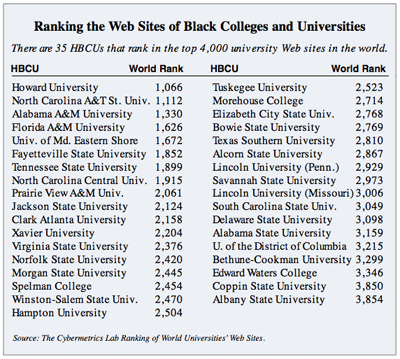No Black Colleges or Universities Listed Among the World’s 1,000 Highest-Rated University Web Sites There are nearly 15,000 higher education institutions worldwide. A total of 35 black colleges and universities have Internet offerings that are ranked among the world’s top 4,000 college and university Web sites. But no HBCU cracked the top 1,000. In just over a decade and a half the Internet has transformed the world of higher education. The nation’s largest research universities now have Web sites that contain tens of thousands of pages of information. The Web is used by universities to share information, as a public and press relations medium, as a tool to recruit students and faculty, and as an aid to teach in the classroom. Colleges and universities use the Web to raise funds, to communicate between faculty, students, administrators, and alumni, to Webcast athletic events, to conduct extensive distance education programs, and for countless other purposes to further the goals and mission of the educational institution. In short, a university’s Web site has become vitally important to the overall functioning of educational institutions. Now the Cybermetrics Lab, a research group based in Spain, has rated nearly 15,000 university Web sites throughout the world. The Cybermetrics Lab publishes a list of the 4,000 top university Web sites. The Web sites are ranked on a number of different criteria including the number of Web pages at the site, the number of links to the university’s Web site from other Internet sites, and the scholarly content available online through the university’s Web site. Clearly the ranking system tends to favor large research universities. These schools have more students and more faculty. Their sheer size alone results in more research, class offerings, faculty biographical information, and other data which produce a greater number of Web pages at these large university sites. However, many of the small, highly prestigious liberal arts colleges in the United States ranked among the top Web sites in the Cybermetics Lab rankings.
American Colleges and Universities Dominate the Leaderboard According to the Cybermetrics Lab, the top 23 ranked university Web sites in the world are all from the United States. In fact, more than half of the top 200 sites are American. And 354 of the top 1,000 sites are operated by American colleges and universities. The University of Toronto, ranking 24th, is the highest-rated site outside the United States. The Massachusetts Institute of Technology is ranked as the top university Web site in the world. Also among the top five sites are Stanford University, Harvard University, the University of California at Berkeley, and Cornell University.
Where Do the Black College Web Sites Stand in the Rankings?
According to the Cybermetrics Lab study, Howard University has the highest-rated Web site of a historically black college or university. Yet Howard is rated in 1,066th position in the world rankings. Howard is ranked just ahead of the Web sites for the Nanhua University of Taiwan and the University of Bordeaux in France. Also ranked among the top 2,000 university Web sites are North Carolina A&T State University, Alabama A&M University and Florida A&M University. The University of Maryland Eastern Shore, Fayetteville State University, Tennessee State University, and North Carolina Central University also rank in the top 2,000. |
|




 Of the 4,000 highest-rated university Web sites in the world, 35 belong to black colleges and universities. In view of the fact that nearly 15,000 college and university Web sites were examined by the Cybermetrics Lab, the report that 35 black colleges rank in the top 27 percent of all university Web sites is good news. The bad news is that none of the black colleges or universities rank among the top 1,000 Web sites worldwide.
Of the 4,000 highest-rated university Web sites in the world, 35 belong to black colleges and universities. In view of the fact that nearly 15,000 college and university Web sites were examined by the Cybermetrics Lab, the report that 35 black colleges rank in the top 27 percent of all university Web sites is good news. The bad news is that none of the black colleges or universities rank among the top 1,000 Web sites worldwide.